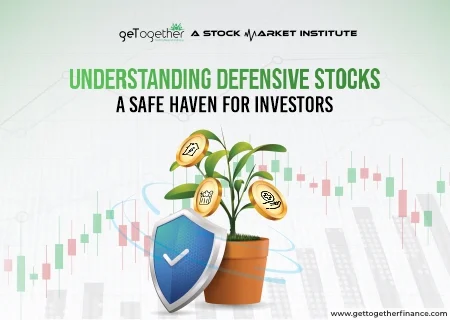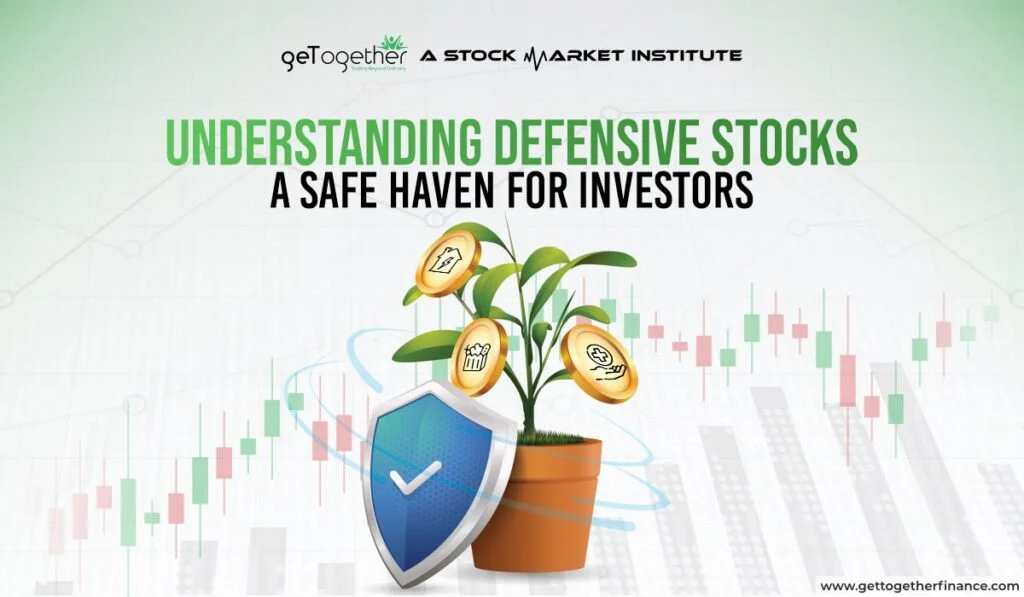Understanding Defensive Stocks a Safe Haven for Investors
- January 17, 2025
- 4774 Views
- by Manaswi Agarwal


Investments come with risks, with the intricacies involved in the stock market, investors look for securities that are safe to invest and can provide efficient returns. As defensive stocks are less sensitive to economic cycles and market fluctuations, they generate stable returns for investors. It is one of the safest investment plans as defensive stocks targets companies that are highly reputed and pay reliable dividends. For the safety and security of your investments, look at this blog briefly and grasp better understanding about defensive stocks.
Table of Contents
ToggleWhat are Defensive Stocks?
Regardless of stock market fluctuation, the stocks that perform consistently and remain stable during different phases of the business cycle are termed as defensive stocks. Due to their stability in the economic cycle of expansion and recession, they are also called non cyclic stocks.
Identification: Defensive stocks usually indicate a low beta which is less than 1. It implies that when the market is expected to fall 10% then these stocks will fall by 5%, on the other hand if the market is expected to rise by 10%, the stocks belonging to these sectors will rise by 5%.
Are Defensive Stocks good to Invest?

The stocks belong to companies with stable and predictable earnings even during economic downturns. The companies tend to perform in favorable directions regardless of the overall state of the economy.
Steady Source of Revenue (Dividends)
Defensive stocks provide regular income through dividend despite market fluctuations. These stocks are the best means of investment when the market is neither bullish nor bearish. Even when the market is highly volatile the stock tends to give investors a steady revenue stream.
Deal with Economic Uncertainties
Diversifying the portfolio among various asset classes requires investors to keep defensive stocks especially as these ensure stability of the portfolio in market downturns. During times of economic uncertainties or recession, defensive stocks are the best option for investment.
Risk Aversion
Investors who do not opt to go with risks or looking for the safest option of investment with no risk tolerance can go for defensive stocks to have more stability and preserve capital. The stocks tend to protect an investor’s capital by managing overall risks of the portfolio during market correction or recession.
Constant Demand
The demand of these stocks remains constant as they fulfill basic needs of individuals by providing essential goods and services like food, healthcare and utilities. The constant demand ensures ongoing profits and revenue generation for the companies leading them towards a stable position.
Industries in Defensive Stocks

Generally, defensive stocks belong to the industry or a sector which has a constant demand. Let us look at the industries or sectors where investors can find stocks to invest and protect their investments.
Utilities
Under this category, essential products like gas, water and electricity which drive basic livelihood needs of individuals are allocated. The demand of these stocks remains the same at each phase of the economy. The demand of these is the least affected by the market changes which makes them a good option for investment.
Consumer Staples
The industry consists of companies that fulfill regular basic needs of individuals such as food, beverages, household items, and personal care products. Demand for these stocks remains unaffected by several market fluctuations. The stocks that belong to this industry tend to outperform during weak economic conditions while underperform during strong economic conditions.
Healthcare
The stocks in the healthcare industry are also regarded as defensive stocks because medical aid is a necessity which is required irrespective of the economic conditions. However, gradual increase in competition has made this sector a bit risky.
A Sight to Remember

During the pandemic of 2020, unexpected substantial volatility in the market caused a huge drop in securities all over the financial markets. Investors had experienced brutal selling in the market which created a panic situation where defensive stocks became a safe haven for fearful investors. The stocks belonging to defensive sectors were able to offer stable returns during the pandemic which was helpful to maintain the portfolio of investors. Cyclical stocks that react to market conditions experienced a great fall with the market situations leaving investors in a great fear,
Defensive Stocks in India
- Hindustan Unilever Limited
- ITC
- Sun Pharmaceuticals
- Dabur Ltd
- Infosys
Drawbacks of Defensive Stocks

Before initiating your investment, it is essentially recommended to go with the technical approach to analyze the price action of a security through charts. Avoiding technical factors can lead you towards bad situations creating several losses in your account. Here are some other risk factors that can impact your investments.
Low Growth Potential
Generally, defensive stocks offer low growth potential as the stocks basically belong to mature companies with slow growth rate. However, dividends are regular but investors cannot appreciate their wealth by investing in these stocks.
Opportunity Cost
When an investor seeks less risk, there is an opportunity cost that needs to be borne by the investor as they tend to miss the higher potential opportunities. They could have invested in stock that has the potential to provide higher returns as compared to defensive stocks.
Interest Rate Impact
Some defensive stocks are sensitive to the changes in interest rates, an increase implies a negative impact on the profitability of companies and make the dividend yields less attractive as compared to other fixed investments.
Regulatory Obligations
Such sectors with constant demand that fulfills basic needs of individuals are subject to follow several legal guidelines. A boundation of regulatory factors might impact the profitability of the business eventually impacting an investor’s portfolio.
Company Specific Risks
Investors are attracted by the dividend payouts generally, if the company faces any kind of financial risks or transforms dividend policies, then it impacts the stock;s attractiveness and its prices.
The Bottom Line
Defensive Stocks are the stocks that do not react to abrupt market situations, as their demand remains constant. Investing in these stocks provides security to investors as they protect their portfolio, but it is important to invest in the stocks after analyzing the price action of each stock. Investors must conduct a thorough top down approach of the stocks as well as the sector before making any move.
FAQs
What are Defensive Stocks?
Defensive stocks are a safe option for investors as these stocks do not react to adverse market situations. The stocks generally belong to the industries that remain consistent in demand irrespective of economic conditions.
Are Defensive Stocks Risky?
Defensive stocks come with a number of benefits for investors, however, low volatility of these stocks does not help investors with a good amount of returns even after a long holding period.
How to pick defensive stocks?
To choose the best defensive stocks, stock beta can be measured that calculates stock’s volatility compared to the overall market. You should also pay attention to the dividend payout records of the companies.
Which industry or companies fall under defensive stocks?
The companies or industries such as utilities, consumer staples, and healthcare which fulfills regular basic needs of individuals fall under this category where demand of the products remains constant.
Is FMCG a defensive sector to invest in?
Investors are finding favor towards investing in the FMCG sector, as the demand remains constant for FMCG products which are expected to perform well in adverse market situations.



 Instagram
Instagram
